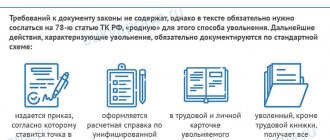Home / Labor Law / Labor Code
Back
Published: 08/10/2016
Reading time: 10 min
0
924
Russian and international legislation provides for special legal relations between employers and women expecting babies. The law unconditionally takes the side of pregnant women. Even under the most difficult circumstances, providing benefits and social guarantees for such employees is the responsibility of any manager. Goals of this direction:
- provide gentle operating modes. The physical, emotional and mental stress of pregnant women is transferred to the unborn child. The International Convention on Maternity Protection (1952) obliged the governments of signatory countries
- ensure acceptable working conditions;
- protect women from discrimination. It is often unprofitable for an enterprise to support expectant mothers. The return from an employee’s work is decreasing, intense physical work is not available to her, and creating special working conditions is troublesome. Not every leader adheres to high moral and ethical standards. To avoid the temptation to fire or harass pregnant women, the law prohibits actions of this kind.
The rights of expectant mothers at the place of work are stipulated in many articles of the Labor Code of the Russian Federation.
- Rights when hiring
- In the process of performing duties Light work Working conditions
- Degree of load and organization of space
The nuances of employing a pregnant woman
In practice, getting a job for a woman expecting a child is quite problematic. Most employers understand that cooperation with such an employee will be short-lived and after she goes on maternity leave, most likely, they will have to look for a replacement, albeit temporary. And this means another training, induction, in a word, an unnecessary waste of time resources.
However, the fact of pregnancy itself cannot serve as a basis for refusal of employment. This point is recorded in Article 64 of the Labor Code of the Russian Federation. Such argumentation is recognized as discrimination, which means that the actions of a potential employer can be appealed through the courts. After all, when hiring a person, only a person’s professional qualities should be assessed, and not his social status, health, nationality, religion and other factors.
Article 64 of the Labor Code of the Russian Federation
“Guarantees when concluding an employment contract” (more details)
Important! According to labor legislation, the employer, at the request of the applicant, is obliged, within 1 week from the moment of presentation, to explain the decision to refuse to provide a job. And in writing. If pregnancy is identified as the reason, the woman can safely go to court.
At the same time, it is worth realizing that employers understand the essence of the situation and are unlikely to voice real reasons for refusal. Most often, the explanation is the banal “we are not ready to make you an offer” or “the professional experience of another candidate suits us better.” The texts of such notifications are quite template and as correct as possible. But if a woman is sure that the pretext is far-fetched and she can prove this fact, then it is still worth filing a complaint with the labor inspectorate. Next, you can go to court.
2 more points worth knowing:
- the employer does not have the right to demand from the applicant a certificate of absence of pregnancy, or a written undertaking not to plan it for a certain period;
- When a woman in a position is employed, she cannot be assigned a probationary period (Article 70 of the Labor Code of the Russian Federation).
Article 70 of the Labor Code of the Russian Federation
“Test when applying for a job” (more details)
In general, the legislation does not oblige the expectant mother to report her situation to a potential employer. It all depends on the woman, her personal moral qualities, needs and life circumstances. However, if an employment contract is signed with a pregnant woman, then the employer will bear considerable responsibility for compliance with its clauses and the special rights that such employees have.
Documents required when applying for a job
To formalize labor relations with any citizen, a single list of documents , provided at the place of work:
- Passport or other identification document.
- Work book (if absent, the employer issues it himself).
- Insurance certificate (SNILS).
- Education document .
There is no medical certificate among the list of documents provided for by the Labor Code.
Right to easier work
Depending on the type of occupation, the expectant mother may apply for a change in working conditions in full or in part. This norm is established by Article 254 of the Labor Code of the Russian Federation. Moreover, all pregnant employees without exception have this right. The field of activity does not play a role here. However, special attention is paid to the presence of harmful and dangerous production conditions.
For example:
- working with chemicals and toxic substances;
- regular physical activity;
- excessive emotional stress in the process of activity.
Article 254 of the Labor Code of the Russian Federation
“Transfer to another job of pregnant women and women with children under the age of one and a half years” (more)
Most often, workers in the trade, medical, pedagogical and banking sectors are transferred to light work. In the first two cases, the activity is directly related to lifting weights and various substances (medicines, household chemicals). In the second there is a psychological load. But bank employees regularly deal with office equipment - a scanner, a computer. Exposure to these devices may also affect the employee and child.
In each case, the hazard factor is determined separately. A woman needs to contact her attending gynecologist, who will analyze her physical indicators and correlate them with the level of comfort, as well as the degree of danger of the activity conditions. If it is determined that at a particular stage the performance of duties may have an impact on health, the employee will receive a medical certificate. Based on it, and at the request of the pregnant woman, the employer will need to change the conditions of her work.
Application for light work during pregnancy (sample)
Adjustment of the list of responsibilities is allowed either completely or partially. For example, a woman may be relieved of certain functions, or a more convenient or shorter schedule may be prepared for her (no more than 1-2 hours). Or completely transfer to another place of activity, which excludes the presence of an unfavorable production factor.
If another job is provided, the woman’s average earnings from her previous job are retained. If a new place is not selected immediately, the pregnant employee is temporarily relieved of her duties. Moreover, during this period she is also entitled to payment of funds taking into account the amount of the average salary.
Pregnant women in hazardous working conditions
How can you call it that colleagues will work more than usual without extra pay? In such a situation, what would you feel towards this pregnant woman? Love and gratitude? Or are you so sure that such a feeling is in principle inapplicable to you, a star? And you don’t want to sit at home, you don’t want to miss out on money. So why should others want to give it to you for their own, and not your, work? You’re not even pregnant yet, and you’re already throwing tantrums and turning on “everyone owes me.” I assure you that in order to write here what people consider necessary, your permission is not required.
What are the answers) and why do pregnant women irritate you so much?) Well, I think that I’ll be jumping from sick leave to sick leave anyway, given my bad experience. but on the other hand, I will be able to do work on the computer, and there is a lot of it. But I was interested in the legal side of the issue. How will they form a relationship with me?
Fringe benefits
The Labor Code fixes other rights of working women expecting a child in the form of separate paragraphs. The following articles and provisions of the Labor Code are significant:
| Article 254 of the Labor Code of the Russian Federation | A pregnant employee retains her earnings for those hours and days when she undergoes a mandatory medical examination |
| Article 260 of the Labor Code of the Russian Federation | Contains a rule according to which a pregnant woman has the right to receive legal paid leave before the start of the maternity period, after it, or immediately after leaving maternity leave to care for the baby. The production schedule is not taken into account in this case. The standard period is 28 days. Any pregnant employee has a similar right; her length of service is not taken into account. |
| Article 259 of the Labor Code of the Russian Federation | The special guarantees available to employed women in the position of |
Pregnant employees are prohibited from:
- involve in work at night (from 22:00 to 6:00);
- call to work on holidays and rest days;
- send on business trips;
- involve in work beyond the work schedule.
Expert commentary
Kamensky Yuri
Lawyer
In each of the above cases, it is not only impossible to insist on going to work, but even to state a similar requirement in the form of a request. Such actions are considered a violation of the law, because a pregnant employee has a special status and we are talking about the health of her and her child.
Do I need to confirm pregnancy and when?
Before we tell you what guarantees are provided to working pregnant women, let us clarify: not a single law specifies the period for notifying superiors about pregnancy.
Judicial practice shows that even if the employer did not know that the employee was planning to become a mother, this does not relieve him of responsibility for violating the norms of the Labor Code of the Russian Federation (clause 25 of the Resolution of the Plenum of the Armed Forces of the Russian Federation dated January 28, 2014 No. 1). Since not only employers, but employees themselves are interested in providing benefits, we recommend explaining to the female part of the team how and when pregnancy is confirmed.
The very first document indicating a woman’s interesting position is a registration certificate, which is issued at any antenatal clinic. If you register for up to 12 weeks, the expectant mother will be paid a one-time benefit (from 02/01/2019 - 655 rubles 49 kopecks) along with maternity benefits. But the document itself or a copy of it can be presented earlier if, for medical reasons or other reasons, the employee has already received the right to certain benefits. The registration certificate will help the employer provide all the guarantees to pregnant women under the Labor Code of the Russian Federation, and the workers themselves will not be left at a loss.
Privileges upon dismissal
Based on Article 261 of the Labor Code of the Russian Federation, the dismissal of a pregnant employee at the initiative of the employer is not allowed. If a woman herself expresses a desire to complete the activity, then she has the right to prepare a corresponding statement. But forcing her to resign, allegedly on her own initiative, is also illegal.
Application for resignation of a pregnant woman at her own request (sample)
Termination of the contract under such circumstances is possible only in the following cases:
- complete cessation of the organization's activities;
- liquidation of individual entrepreneurs;
- expiration of the period of a fixed-term contract signed with a pregnant employee, if on its basis she replaced the main employee.
In the latter case, the employer is obliged to offer the woman other vacancies and, with her consent, arrange a transfer to another place of activity.
Expert commentary
Kireev Maxim
Lawyer
If a regular fixed-term contract was concluded with the employee and its period ended at the time of pregnancy, then the employer, at the woman’s request, is obliged to extend the period until the birth of the child or until the end of maternity leave (maternity leave). In addition, the employee will need to present a medical certificate certifying the fact of her special situation.
Termination of an employment contract
Perhaps for this reason, in practice there are cases when a woman hides her pregnancy during employment. Could this circumstance serve as grounds for her dismissal? As a general rule, it cannot. Although this situation in most cases will cause a conflict with the employer, especially if the employer is not a large, stable company with large incomes and a large staff. A woman will be able to justify her case, first of all, by the fact that pregnancy is not an obstacle to employment, and therefore she was not obliged to notify the employer about its presence. In addition, the Labor Code of the Russian Federation contains a direct prohibition on termination of an employment contract at the initiative of the employer with pregnant women, regardless of the moment of pregnancy, with the exception of cases of liquidation of the organization or termination of activities by an individual entrepreneur (Article 261 of the Labor Code of the Russian Federation).
An important circumstance is the fact that this guarantee applies equally to women working under both fixed-term and open-ended contracts.
HR SERVICES
If a fixed-term employment contract expires during a woman’s pregnancy, the employer is obliged to extend the term of the employment contract until the end of the pregnancy. The phrase “until the end of pregnancy” means, firstly, that the contract will be terminated not only in the event of the birth of a child, but also in the event of artificial termination of pregnancy, including for medical reasons, and termination of pregnancy for other possible reasons, and secondly, This phrase also means that the contract does not cease to be urgent.
It should be noted that, since the Labor Code of the Russian Federation requires the extension of the employment contract only until the end of pregnancy, the employer is not obliged to extend the employment contract until the end of parental leave until the child reaches the age of three years.
Maternity leave
In the ordinary sense, the concept of “maternity leave” includes 2 periods at once - for birth and delivery (pregnancy and childbirth) and for caring for a newborn child. The procedure for granting each of these holidays is fixed at the legislative level. Namely, in articles 255 and 256 of the Labor Code of the Russian Federation.
Article 255 of the Labor Code of the Russian Federation - Maternity leave
Women, upon their application and on the basis of a certificate of incapacity for work issued in accordance with the established procedure, are granted maternity leave of 70 (in the case of multiple pregnancies - 84) calendar days before childbirth and 70 (in the case of complicated childbirth - 86, for the birth of two or more children - 110) calendar days after childbirth with payment of state social insurance benefits in the amount established by federal laws. Maternity leave is calculated cumulatively and is provided to a woman completely regardless of the number of days actually used by her before giving birth.
Article 256 of the Labor Code of the Russian Federation - Parental leave
Upon application of a woman, she is granted maternity leave until the child reaches the age of three years.
The procedure and timing of payment of state social insurance benefits during the period of the specified leave are determined by federal laws. Parental leave can be used in full or in parts by the child’s father, grandmother, grandfather, other relative or guardian actually caring for the child. At the request of the woman or the persons specified in part two of this article, while on maternity leave, they can work part-time or at home while maintaining the right to receive state social insurance benefits.
During the period of parental leave, the employee retains his place of work (position).
Parental leave is counted toward the total and continuous work experience, as well as into the length of service in the specialty (except for cases of early assignment of an old-age insurance pension).
When applying for a maternity leave, a woman acquires the right to the following guarantees:
- payment of benefits during the entire period of absence;
- maintaining the place of business for the entire period;
- inclusion of periods in a woman’s work experience.
In general, the procedure for applying for a maternity leave is quite simple. The employee must submit a written request for leave under the Labor and Employment Regulations (in general, 140 days). Additionally, you will need a certificate of incapacity for work issued by a gynecologist. After the end of this period and at the request of the woman, she can also request the next leave - to care for a newborn child. In fact, the period is drawn up until the last person reaches 3 years. However, the employee can go to work earlier. For example, at 1.5 years.
Expert commentary
Potapova Svetlana
Lawyer
In addition, during maternity leave, the employee is allowed to work either from home or on a part-time basis. At the same time, the right to social benefits is preserved.
Pregnant women have a considerable number of labor privileges. Facilitated operating conditions, a ban on overtime and night work, the impossibility of dismissal at the request of the employer and other guarantees protect employees in a special position. If the employer ignores the law, then the woman has the right to file a complaint with the labor inspectorate or go directly to court. If the fact of unlawful actions of the employer is proven, he may face not only an administrative fine, but also criminal liability (for example, under Article 145 of the Criminal Code of the Russian Federation).
What reasonable and unfounded arguments do employers give?
The norm that guarantees the right of pregnant women to work was not introduced by chance. The fact is that employers are extremely reluctant to hire such applicants as employees, for the following reasons:
- Difficulties with terminating an employment contract. As mentioned earlier, it is almost impossible to fire a pregnant woman at the initiative of the employer. This often leads to the fact that incompetent and unscrupulous workers get jobs with a lack of motivation to work.
- The need to provide maternity leave. Leaves associated with the birth and care of a child can last several years in total, so the employer will be forced to additionally hire a temporary employee for these periods.
- Difficult pregnancy. If a woman’s pregnancy proceeds with complications, then the employer will be forced to let her go on sick leave and also simplify working conditions, which does not always have a beneficial effect on the work process.
- Payments of benefits. This argument is not constructive. Payments for pregnancy and child care are made through the Social Insurance Fund, and the employer has only an indirect relation to this.
Working overtime
Quite often, companies provide employees with the opportunity to work overtime in order to earn higher earnings. Companies also often send employees on business trips.
According to the Labor Code of the Russian Federation, it is prohibited to send a pregnant woman employee on business trips or to involve her in overtime work. However, a pregnant employee has the opportunity to make business trips and work overtime, but only at her own request, and with a statement that confirms this.
Harmful and dangerous working conditions
Secondly, the employee must express written consent to take one of the proposed vacancies (a note about this can be provided in the document with the vacancy offer). Thirdly, an order is issued to transfer the employee to another job based on a medical report.
Sometimes workers whose positions (professions) are not included in the List occasionally work in harmful or dangerous conditions. On the days they perform “harmful” work, they are given a shortened working day of the same duration as employees whose positions (professions) are indicated in the List (clause 20 of the Instructions).
Employer's rights
Unfortunately, the laws in Russia are not perfect; sometimes an employer can send a woman on a business trip, or fire a pregnant woman on his own initiative. This often happens when the employer is simply not aware of the employee’s pregnancy, usually this happens in the early stages of pregnancy, and sometimes the employee herself is not aware that she is pregnant. Therefore, in order to avoid unpleasant situations, girls should closely monitor their health, and in case of pregnancy, immediately obtain an appropriate certificate from a doctor to present to the employer, thereby notifying him of their situation.
Pregnant woman works in hazardous working conditions
The employer pays for maternity leave, leave for employees who have adopted a newborn child (children), with the preservation of the average salary, if this is provided for by the terms of the labor and (or) collective agreement, the act of the employer, minus the amount of social benefits in case of loss income in connection with pregnancy and childbirth, adoption
In accordance with subparagraph 65) of paragraph 1 of Article 1 of the Code of the Republic of Kazakhstan on public health and the healthcare system dated September 18, 2021, No. 193-IV (as amended and supplemented as of April 19, 2021):
Working conditions for pregnant women
If an employee expresses a desire to change her job duties and confirms her status with medical documentation (it can be completed at the first visit to a gynecologist), the necessary work is selected. After this, the organization issues an order to transfer the woman to another job and set her a new salary, the minimum amount of which is equal to the average salary in her previous position.
We recommend reading: How to hide accounts payable from the tax authorities
If situations arise when working conditions do not allow the expectant mother to be transferred immediately (there are no vacancies or the woman is not qualified), the employer removes her from work while maintaining the average salary. The suspension lasts until transfer becomes available.
Harmful working conditions for pregnant women
The main management will arrive tomorrow and I need arguments and an action plan for what to ask for. I am hope for your help! First, you need to get a certificate from a doctor stating that you need to be protected from negative influences. And then read the example: Answer: The concept of “exemption from work” is used in the Labor Code of the Russian Federation in different meanings - and as a complete release of an employee from performing labor duties duties subject to attendance at the place of work (Art.
It should be noted that the Labor Code of the Russian Federation does not limit the number of hours by which working time can be reduced. Therefore, the employer agrees on how much shorter the working day will be than usual. Part-time work does not entail any restrictions on the duration of annual paid leave, calculation of length of service and other rights.
Reduction
Many women are concerned about a number of questions: Can a pregnant woman be fired? Also, does an employer have the right to lay off a woman in position? They do not have the right to lay off a woman in this position. If a company abolishes a position in which a pregnant employee works, she is required to offer her another position, although her earnings may not be retained; if the woman does not agree to work in the new position, she must resign, or the employer fires the employee on its own with the appropriate wording.







